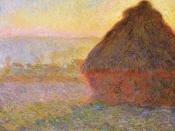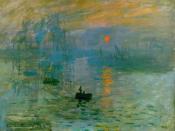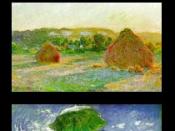"Modernist styles such as impressionism, post impressionism, cubism and expressionism challenged conventional ideas in art making and the ways in which art was thought about." Throughout history, there have been numerous artistic movements which have challenged the traditions of art and changed the ways in which art is created and viewed. However, of these movements, none have been as revolutionary and ground-breaking as Modernism. Modernism, a period from the eighteen sixties to the nineteen seventies, rejected the past, highly conventional ways of making art and attempted to come to terms with the urban, industrial and secular society that began to emerge in the mid-nineteenth century. There were many movements within Modernism; but none challenged conventional ideas about art to the same extent as Impressionism and Cubism. These movements produced uniquely innovative artists whom, through their works, prepared the way for twentieth century art. This essay will analyze Impressionism and Cubism, examining how through their respective artists, these movements changed conventions in art.
The Impressionist period was the first momentous progress towards challenging traditional ideas in art. Greatly influenced by the development of photography and colour research during the nineteenth century, this period allowed artists to concentrate on truths beyond external appearances. Impressionist artists such as Claude Monet and Auguste Renoir, set out to achieve greater naturalism by capturing a fleeting moment by using light and colour to create form and atmospheric effects. These men were some of the first artists to reject conventional Renaissance art ideals and in doing so altered the style, subject matter and purpose of painting. Past paintings of historical or mythological themes were replaced by paintings that had direct bearing on people's lives.
"Monet is the quintessential Impressionist, and as such his world is exhilaratingly beautiful."
Recognized as the 'Father of Impressionism', Claude Monet is...


